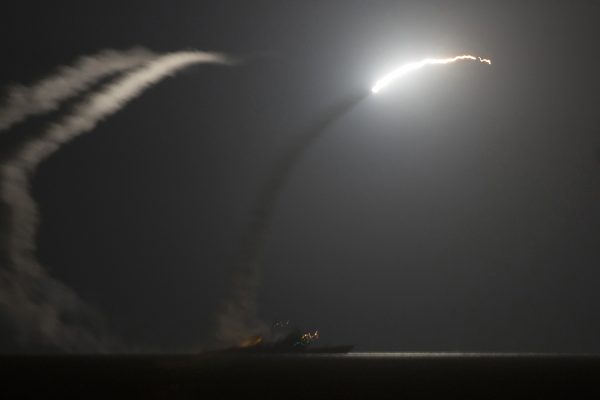
Convincing Arab allies to join in airstrikes against Islamic militants in Iraq and Syria is a political and strategic victory for American president Barack Obama. But it might not be enough to defeat the group that calls itself the Islamic State.
America’s Defense Department said Bahrain, Jordan, Qatar, Saudi Arabia and the United Arab Emirates participated in and supported the attacks against Islamic State targets although it did not specify which countries conducted airstrikes of their own. Given Bahrain’s small military and the other monarchies’ mistrust of Qatar, it seems likely these two countries only allowed their bases to be used for the operation.
Bahrain headquarters the American Fifth Fleet while Qatar hosts an air and an army base for the United States.
Warplanes and Tomahawk cruise missiles launched from American navy vessels in the Persian Gulf overnight struck “fighters, training compounds, headquarters and command and control facilities, storage facilities, a finance center, supply trucks and armed vehicles,” the military said.
The mission was not limited to hitting the Islamic State, a militant group that has taken control of parts of eastern Syria and western Iraq. The United States said jets also struck eight targets associated with another terrorist organization in Syria made of up Al Qaeda veterans.
“We’re going to do what’s necessary to take the fight to this terrorist group,” President Obama said on Tuesday. He cautioned that the effort “will take time.”
The president announced in an interview earlier this month that the Unite States would “systematically degrade” the capabilities of the Islamic State. “We’re going to shrink the territory that they control. And ultimately, we’re going to defeat them,” he said at the time — after pledging not to involve American soldiers on the ground.
Airstrikes were first launched against the militants in Iraq in August when they menaced the territory of the autonomous Kurdistan Regional Government in the north of the country. Western powers have since supplied weapons to the Kurds to help them fend off the Islamic State’s attacks.
The jihadist group still controls an arc of territory from Aleppo in Syria to near the western edge of Iraq’s capital, Baghdad, effectively eradicating the border between the two countries that was drawn by European imperialists a century ago. It has made itself notorious by slaughtering nonbelievers and beheading foreigners.
Obama previously resisted calls to expand the campaign into Syria where, to the apprehension of many of America’s allies the Middle East, he was also reluctant to get involved in a civil war that pits the regime of Iranian ally President Bashal al-Assad against a largely Sunni opposition. The Islamic State was among those Sunni rebel groups although it has lately focused more on consolidating territory than combating Assad and his allies.
Given that many Arab states would rather hasten Assad’s demise and set back their nemesis, Iran, bringing them into the fold to pursue a broad campaign against the Islamic State — which is an enemy of Assad’s as well — is no small feat. But it is doubtful whether airstrikes alone will do more than halt the group’s momentum.
As The Atlantic‘s Jeffrey Goldberg puts it, “A terrorist preoccupied with his own survival has less bandwidth to threaten yours.” But that is not the same as defeating the Islamic State. “Like other terror groups,” he suggests, “it can ‘win’ this current round of fighting by surviving and maximizing civilian casualties on its own side.”
The American Interest‘s Adam Garfinkle agrees. Airstrikes won’t drive the militants out of the cities and towns, he writes. “That requires boots — and blood — on the ground and if no ally will supply it, as seems almost certain, we will either have to do it ourselves or face defeat by our own definition of the mission.”
